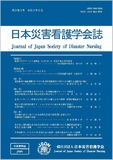Japanese
English
- 有料閲覧
- Abstract 文献概要
- 参考文献 Reference
- サイト内被引用 Cited by
要約
目的:阪神・淡路大震災を学童後期に経験したことによる人生への影響を、20年後の語りから明らかにすることである。
方法:震災を経験後、それに関連した心身の問題が顕在化することなく成長し大人になった3名にインタビューし、テーマ分析に基づき、個々の人生への影響を記述した。
結果:参加者らは、対処能力を超える地震の再来に怯え備えながらも、自分よりも深刻な喪失をした人々の痛みを気遣い、被災時の経験を語ることを遠慮しながら成長していた。そして震災経験の肯定的な意味を発見し、震災経験がある人としての自分の役割を実践しようとしていた。
結論:参加者らは、震災後、他者との相互作用の過程で自らの被災者としての位置づけを認識して当事者性を育みながら、支援者への役割転換を遂げており、震災経験は学童後期だった人々の他者貢献への意欲に影響していることが示唆された。
Objective: This study was aimed to explore the impact of an earthquake on lives based on the narratives of child survivors of the 1995 Great Hanshin-Awaji Earthquake.
Methods: Narrative interviews were conducted with adult survivors in the Hanshin area, Hyogo prefecture. At the time of the earthquake, the participants had been school-going age and they did not receive any medical intervention following the disaster. Interview transcripts were analyzed using a thematic analysis approach.
Results: The three participants grew up with a reserved attitude towards talking to other people about their disaster experience, because they cared about other survivors' pain of loss, but they had been living with fears and were preparing for a possible future earthquake. They also found positive meaning in the disaster experience during the 20 years following the disaster and were trying to practice their roles as adults with disaster experience.
Discussion: This study suggests that disaster experiences affect child survivors' willingness to be helpful people because all participants commonly experienced a role transition from being supported to supporting others and establishing an own identity as a child survivor through interaction with other survivors during the 20 years.
Copyright © 2020, Japan Society of Disaster Nursing All rights reserved.


